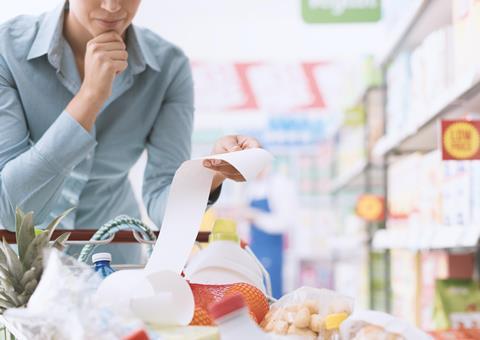
Top story
Grocery price inflation reached a new high of 17.5% over the four weeks to 19 March, costing households an additional £837 on their annual supermarket bills.
According to the latest grocery market share data from Kantar, this inflation drove an 8.6% uplift in take-home grocery sales over the 12-week period.
Fraser McKevitt, head of retail and consumer insight at Kantar, commented: “Unfortunately, it’s more bad news for the British public, who are experiencing the ninth month of double-digit grocery price inflation.
“However, shoppers are taking action and clearly hunting around for the best value. Footfall was up in every single grocer this month, with households going to the shops just over four times per week in March. Apart from Christmas, that’s the highest frequency we’ve seen since the start of the pandemic.
“The supermarkets are also tackling grocery price inflation, battling it out to demonstrate value and get customers through their doors. This is a fiercely competitive sector and if people don’t like the prices in one store they will go elsewhere, with consumers visiting three or more of the top 10 retailers in any given month on average.”
Aldi and Lidl have been the biggest beneficiaries of shopping behaviour shift so far in 2023, with Aldi’s sales up 25.4% over the 12-week period and Lidl 25.8%.
Iceland has also seen strong growth of 9.6% over the period.
Of the mults, Asda was the fastest growing at 7.3% with both Tesco and Sainsbury’s on 6.9%. Morrisons returned to growth of 0.1% in the period.
Waitrose also had a positive period, pushing up sales by 2.1% to deliver the fastest rate of growth for the John Lewis Partnership-owned supermarket since September 2021.
Overall, own label lines and sales were up again by 15.8% during the latest four weeks compared with last year.
Outside the discounters Aldi and Lidl, branded goods still make up 52% of the market and sales grew by 7.2% over the past month, the fastest rate since February 2021.
Despite high-profile shortages of fresh fruit & vegetables, Kantar’s latest data shows that shoppers didn’t generally go without.
McKevitt commented: “Despite concerns about shortages, the number of baskets containing tomatoes, cucumbers or peppers in the 10 major grocers stayed at 17% in March, the same as February. For any shoppers who couldn’t get what they wanted in larger supermarkets, the independents stepped in, with the volumes of tomatoes, peppers and cucumbers in baskets rising by 32%, 26% and 21% respectively in these stores.”
Morning update
Diageo has announced Ivan Menezes has decided to retire as CEO on 30 June 2023 after 10 years running the spirits giant, to be replaced by current chief operating officer Debra Crew.
Menezes joined Diageo through the merger of Guinness and Grand Metropolitan in 1997 and has held a number of senior positions in the business including COO, president of North America; and chairman of Asia Pacific and Latin America and Caribbean.
He has been an executive director of Diageo since July 2012 and has served as CEO since July 2013, overseeing an “outstanding period of change, growth and high performance”.
In January 2023, Menezes was awarded a knighthood for services to business and to equality in the King’s 2023 New Year Honours List.
Prior to being appointed COO in October 2022, Debra Crew was president, Diageo North America and global supply, leading Diageo’s largest market to 14% organic net sales growth in 2022, following on from 20% organic net sales growth in the prior year.
She originally joined the Diageo board as a non-executive director in April 2019, before stepping down from the board when appointed to run its North American business in July 2020.
She is the former president and CEO of Reynolds American and previously spent five years at PepsiCo as well as holding positions with Kraft Foods, Nestlé and Mars.
Javier Ferrán, chairman, Diageo, commented: “The Board is enormously grateful for Ivan’s contribution over the past decade. Under his stewardship, Diageo has consistently delivered a truly impressive performance to become one of the most respected businesses in the world.
“Ivan has transformed Diageo’s global footprint, brand portfolio and strategic focus, positioning our business as a clear leader in premium drinks. At the same time as delivering consistent shareholder returns, Ivan has nurtured a diverse and talented global workforce and made significant progress on the most material sustainability issues facing our business. Ivan leaves Diageo extremely well positioned for future growth, and we thank him again for everything he has helped us to achieve.
“The Board has diligently planned for Ivan’s successor, and we are delighted to have appointed a leader of Debra’s calibre to the role. Debra has been a highly valued member of Diageo’s leadership team in recent years with an impressive track record of delivery both at Diageo and across other global consumer goods companies. She has deep consumer industry expertise as well as proven strategic capabilities, strong operational performance and a clear ability to build and lead teams. I have no doubt that Diageo is in the right hands for the next phase of its growth.”
Menezes added: “It has been an enormous honour leading Diageo over the past decade. I am extremely proud of what we have achieved during that time, and I would like to thank my 28,000 talented colleagues around the world for all of their hard work, creativity and passion.
“I am delighted to be handing over the reins to Debra. I am confident that under Debra’s leadership, and with our extraordinary portfolio of brands and culture, Diageo will go on to deliver our long-term performance ambition.”
Crew commented: “Ivan leaves Diageo in a very strong position for future growth and I look forward to working with our teams around the world to capture the opportunities ahead.
“I am focused on continuing Diageo’s extraordinary track record of building world-leading brands and enhancing our reputation as one of the most responsible businesses in what I believe to be the most exciting consumer products category. It is an incredible privilege to be leading Diageo through the next phase of its development.”
Elsewhere, Ocado Retail – the joint UK venture between Ocado and Marks & Spencer – has issued a trading update for the 13 weeks to 26 February 2023.
The online retailer’s first quarter revenues were up 3.4% year on year to £584m.
That growth was driven by average orders per week rising 3.6% to 381,000 as active customers reached 951,000, up 13.8% year on year.
However, average basket value remained flat, with a 7.5% fall in basket size, to 45 items. This was offset by a 8.3% increase in average selling price, while order frequency returned to pre-Covid levels.
Ocado said its ‘perfect execution’ programme was driving improved service levels, with on time delivery and order accuracy back to pre-pandemic levels, while it increased its range of M&S products and made further investment in value through the launch of the Ocado Price Promise.
Hannah Gibson, Ocado Retail’s CEO, said: “We continue to attract more and more customers to Ocado, by investing in great value for customers including our new Ocado Price Promise and providing unbeatable choice and service. This means more perfect orders that are on time and in full, with deliveries back to the kitchen table. We are also championing smaller suppliers and creating more of the M&S magic for customers by offering more of the products they love.
“While the trading environment remains challenging, we expect to build momentum through the second half of the year, as we improve our proposition, grow our customer base, and no longer lap Covid shopping behaviours. This solid 2023 performance will enable us to return to sales growth and profitability.”
There is no change to guidance issued with Ocado Group’s annual results on 28 February, with Ocado Retail expected to show mid-single digit growth, improving during the year, and marginally positive EBITDA.
Also in company news, soft drinks player AG Barr has posted strong double-digit growth for the year, though it warned its investment in growth would compress margins.
Total revenues in the year to 29 January increased by 18.2% on a reported basis to £317.6m and 15.9% on a like-for-like basis.
This revenue increase was driven by a combination of brand momentum, revenue management and the incremental contribution from its Moma and Boost Drinks acquisitions.
Barr Soft Drinks saw strong performance across its portfolio driven by continued focus on consumer engagement and investment in brand building.
The division saw strong top line revenue growth of 12.4%, driven by volume growth, disciplined pricing and promotional management as well as a small element of favourable brand and channel mix.
Irn-Bru revenue grew by 6% with a strong performance in the out-of-home channel more than compensating for lower take-home sales, while Rubicon was up 8% in volume and over 20% in revenue, with the brand benefiting from increased distribution, continued innovation, and a strong marketing programme.
Funkin consolidated its position as the number-one take home cocktail brand in the fast-growing UK cocktail market, with sales up 16%.
It completed the acquisitions of both Boost Drinks and the remaining equity in Moma Foods in December 2022, adding high-growth functional beverage and plant-based milk categories to the group.
Adjusted profit before tax was up 13.3% to £43.5m.
Adjusted operating margin reduced to 13.6% from 14.9%, reflecting supply chain cost inflation plus the expected short-term impact of lower margin Moma and Boost, alongside accelerated investment, including significant Funkin and Moma marketing.
In 2023, the group said it remained confident of delivering further revenue and profit growth in the year ahead in line with management expectations.
CEO Roger White commented: “Over the past 12 months we delivered an excellent financial performance and made significant progress across our strategic objectives, an achievement only made possible by our committed and hard-working teams.
“Our strategy to build and develop a multi-beverage portfolio capable of significant long-term growth is progressing well. We are now in an investment phase, designed to capitalise on the strategic growth opportunities ahead. We do anticipate a short-term impact on operating margins, as a result of the combination of this investment, ongoing inflationary cost pressures, and the initial dilutive impact from the Boost acquisition.
“This growth and investment phase will support the rebuilding of our operating margin over the medium term and the creation of a stronger and more sustainable business.”
Finally, on a busy morning, retail price growth accelerated to a new high of 8.9% in March, up from 8.4% in February, according to the latest BRC-NielsenIQ Shop Price Index.
Non-food inflation accelerated to 5.9% in March, up from 5.3% in February, which was above the three-month average rate of 5.4%
Food inflation accelerated to 15% in March, up from 14.5% in February, which is now the highest inflation rate in the food category on record.
Fresh food inflation accelerated to 17% in March, up from 16.3% in February, while ambient food inflation accelerated to 12.4% in March, up from 12.2% in February. Both represent the highest rate of inflation in those categories recorded to date.
Helen Dickinson, BRC CEO, said: “Shop price inflation has yet to peak. As Easter approaches, the rising cost of sugar coupled with high manufacturing costs left some customers with a sour taste, as price rises for chocolate, sweets and fizzy drinks increased in March. Fruit & vegetable prices also rose as poor harvests in Europe and North Africa worsened availability, and imports became more expensive due to the weakening pound. Some sweeter deals were available in non-food, as retailers offered discounts on home entertainment goods and electrical appliances.
“Food price rises will likely ease in the coming months, particularly as we enter the UK growing season, but wider inflation is expected to remain high. Retailers continue to work hard to keep prices, particularly of essentials, as low as possible by expanding value ranges and offering discounts for vulnerable groups. Government must also minimise oncoming regulatory burdens, as these will serve as a drag on investment and will ultimately contribute to higher prices for UK consumers.”
Mike Watkins, head of retailer and business insight, NIQ, said: “Inflation continues to have an impact on the spending power of shoppers and increased energy bills from April will add more pressure. Since food prices have risen retailers have seen more visits but less basket spend, as shoppers manage their weekly food bills by shopping little and more often and seeking out the lowest prices. And as Easter approaches some high street retailers will also be offering discounts and promotions to encourage customers to spend.”
On the markets this morning, the FTSE 100 is up another 0.4% to 7,503pts.
Risers include Naked Wines, up 4.4% to 104.5p, Marks & Spencer, up 3% to 159.8p and Sainsbury’s, up 1.6% to 265.5p.
Fallers include Finsbury Food Group, down 1% to 95p, Hilton Food Group, down 0.9% to 672p and AG Barr, down 0.8% to 537.9p.
Yesterday in the City
The FTSE 100 kicked off the week rising 0.9% to 7,471.8pts.
Risers yesterday included Nichols, up 3.3% to 1,105p, Ocado Group, up 2.9% to 452.1p, Finsbury Food Group, up 2.1% to 96p, PZ Cussons, up 2% to 183p, Greggs, up 1.8% to 2,678p, Associated British Foods, up 1.8% to 1,951p and Marks & Spencer, up 1.7% to 155.1p.
Fallers included Bakkavor, down 3.1% to 105p, Deliveroo, down 2.6% to 88.3p, Virgin Wines, down 2.2% to 44p, C&C Group, down 1.9% to 153.3p and Just Eat Takeaway.com, down 1.5% to 1,456.6p.







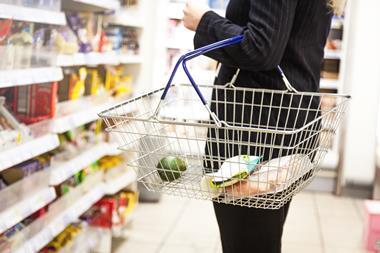
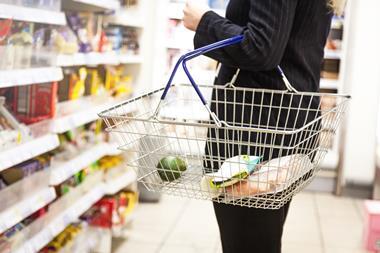
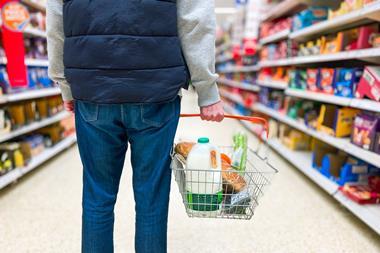


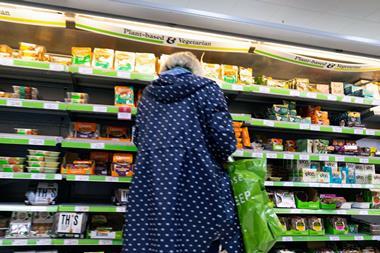
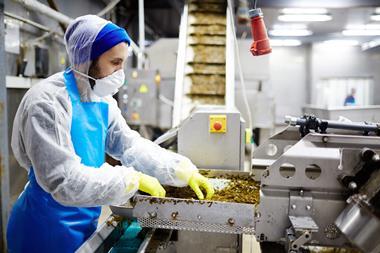
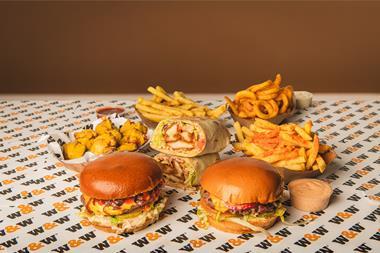
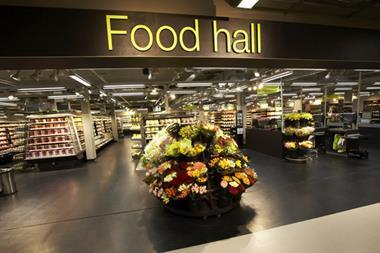
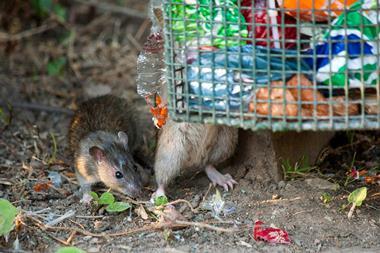


No comments yet